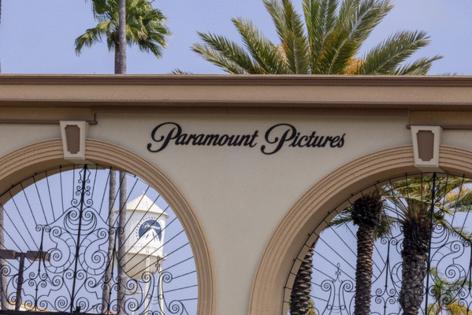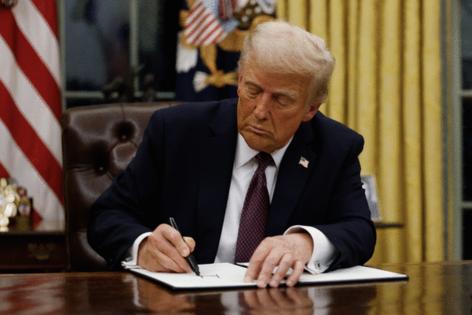Paramount agrees to pay $16 million to settle Trump's CBS '60 Minutes' lawsuit
Published in News & Features
LOS ANGELES — Paramount Global has agreed to pay $16 million to end President Donald Trump’s lawsuit over edits to a “60 Minutes” interview — a legal tussle that roiled CBS News, spurred high-level departures and threatened to derail the company’s hoped-for sale.
The money will be allocated to Trump’s future presidential library. As part of the deal, Paramount did not offer an apology or express regret for CBS News’ reporting or edits.
“No amount will be paid directly or indirectly to President Trump,” Paramount said in a statement. “The settlement will include a release of all claims regarding any CBS reporting through the date of the settlement, including the Texas action and the threatened defamation action.”
Paramount decided to buy peace with the president rather than wage a costly fight to defend “60 Minutes” and its journalists in court. The move prompted an outcry by 1st Amendment experts who denounced the lawsuit as frivolous and the talks to reach Tuesday’s settlement as a shake-down.
The company’s leaders hope the settlement will clear a path for the company’s sale to David Ellison’s Skydance Media — a deal that needs the blessing of the Federal Communications Commission.
Instead of fast-tracking the review of the proposed Paramount-Skydance merger, the Trump-appointed FCC chairman opened an inquiry into whether edits of the October “60 Minutes” interview with then-Vice President Kamala Harris rose to the level of news distortion.
“The Company has agreed that in the future, ’60 Minutes’ will release transcripts of interviews with eligible U.S. presidential candidates after such interviews have aired, subject to redactions as required for legal or national security concerns,” Paramount said.
The two sides have participated in mediation sessions for the past two months. Paramount said the terms of the settlement were proposed by the mediator. Paramount’s $16 million payment will include Trump’s attorneys fees.
“President Donald J. Trump delivers another win for the American people as he, once again, holds the Fake News media accountable for their wrongdoing and deceit,” said a spokesman for Trump’s legal team in a statement. “CBS and Paramount Global realized the strength of this historic case and had no choice but to settle.”
“President Trump will always ensure that no one gets away with lying to the American People as he continues on his singular mission to Make America Great Again,” the statement continued.
Trump has long maintained last fall’s “60 Minutes” interview was edited to make Harris look smarter to boost her November election chances. CBS denied the allegations, saying the edits were routine.
The unedited footage confirmed that Harris was accurately quoted.
But Trump’s team said the edits caused Trump “mental anguish.” After returning to the White House this year, Trump doubled his lawsuit damages demand to $20 billion.
“Her answer was horrendous,” Trump told reporters last month on the White House lawn. “I would say election-threatening. ... Her answer was election-threatening it was so incompetent.”
Trump’s lawsuit called the edits “malicious, deceptive, and substantial news distortion calculated to confuse, deceive, and mislead the public.” The trims, the suit alleged, were “partisan and unlawful acts of election and voter interference.”
CBS has acknowledged editing the interview, which is routine in the news business. Longstanding 1st Amendment interpretations give news producers wide latitude to decide what material to broadcast as long as they don’t distort the information presented to viewers.
Paramount’s controlling shareholder Shari Redstone pushed for a settlement. The Redstone family’s investment firm, which holds the controlling Paramount shares, is juggling more than $400 million in debt and she wanted to facilitate the sale of Paramount, as well as her family’s holding firm, to Skydance.
Family members are counting on their portion of the Paramount sale proceeds. A representative has said Redstone recused herself from decisions dealing with Trump’s lawsuit but the mogul had made clear her desire for a settlement.
The Redstone family controls 77% of Paramount voting shares.
Skydance executives and their private equity partners also agitated for Paramount to end the bickering with Trump to resolve a key headache before the new owners take over.
Paramount, in a statement, said it has treated Trump’s lawsuit “completely separate from, and unrelated to, the Skydance transaction and the FCC approval process.”
It’s been nearly a year since Redstone and fellow Paramount directors approved Skydance’s two-phased $8-billion deal.
David Ellison, son of tech billionaire Larry Ellison, is eager to run the company that boasts the legendary Melrose Avenue film studio, the Paramount+ streaming service, CBS and cable channels including Comedy Central, Nickelodeon and BET.
Skydance operations and personnel are expected to be folded into Paramount in the second phase of the transaction.
The deal faces one last regulatory hurdle. Paramount must win FCC Chairman Brendan Carr’s consent to transfer more than two dozen CBS station licenses to the Ellisons. FCC approval has been held up for months.
Skydance and Paramount face an October deadline to finalize the deal or risk its collapse.
Redstone would then have to come up with hundreds of millions of dollars to satisfy her creditors, including Larry Ellison, giving her another reason to favor a settlement.
Her willingness to set aside free speech values prompted push-back from journalists. The nonprofit Freedom of the Press Foundation decried Paramount’s decision to cede 1st Amendment freedoms in an effort to advance the Skydance deal. It vowed to sue Paramount if it settled.
But the deal’s months-long delay was wearing.
Redstone separately disclosed in early June that she was being treated for thyroid cancer.
The legal saga began last fall when CBS News invited both Harris and Trump to sit down with “60 Minutes,” a campaign season tradition. After initially agreeing, Trump backed out.
CBS went forward with the Harris piece but got into hot water after the network broadcast two portions of her response to a question by CBS correspondent Bill Whitaker. When he challenged Harris about the Biden Administration’s struggles dealing with Israel’s prime minister, Harris gave a three-sentence answer.
CBS’ Sunday morning show, “Face the Nation” aired her first sentence, which was convoluted. The following night, “60 Minutes” ran the second part of her answer, which was forceful and succinct.
Trump and his supporters cried foul, pointing to the discrepancies.
The showdown accelerated a week before the election when Trump filed his lawsuit in Amarillo, Texas. He accused CBS of trying to cover up Harris’ “word salad” to manipulate the results of what was expected to be a tight election.
Trump won decisively, and CBS sought to have the case dismissed.
The network’s lawyers said its journalists were protected by the 1st Amendment. It also argued that the case should be moved from west Texas, where it was heard by a Trump-appointed federal judge. The lawyers sought to get the case moved to a New York court, where CBS and “60 Minutes” are based.
The interview in question didn’t mention Texas. In February, Trump added U.S. Rep. Ronny Jackson, his former doctor, to the lawsuit as an additional plaintiff. Jackson is a Texas resident.
Tuesday night’s settlement stipulated that Jackson would not receive any money.
Earlier this year, the Texas judge ordered the two sides to present their cases to a mediator. A retired judge who handles complex litigation began hearing the matter April 30.
The controversy stabbed at the heart of CBS News and its legacy of fearless broadcast journalism.
CBS News producers have long maintained they did nothing wrong. Journalists refused to sign any apology, which was long seen as a key demand from Trump and his team.
Inside the company, a pitched battle raged for months.
In late April, the executive producer of “60 Minutes,” Bill Owens, quit. That prompted longtime CBS newsman Scott Pelley to inform “60 Minutes” viewers the show had faced increased corporate oversight because of Paramount’s desire to win the Trump administration’s approval of the Skydance deal.
“None of our stories has been blocked,” Pelley told viewers. “But Bill felt he lost the independence that honest journalism requires.”
Some corporate executives were furious over Pelley’s public statements, insiders have said.
The Trump dispute also contributed to the departure of Wendy McMahon, the president of CBS News and Stations. She stepped down under pressure in May.
There were other sore points. Redstone, who also serves as the chair of the Paramount board, had also expressed dissatisfaction with CBS News’ coverage of the Israel-Hamas war.
Fallout from the settlement could prompt additional headaches.
Three Democrat U.S. senators warned Redstone that Paramount could face allegations of bribery if it wrote a big check to mollify Trump in an effort to facilitate the FCC’s review of the Skydance deal.
The Wall Street Journal reported that Paramount offered Trump $15 million to make the lawsuit go away, but he declined.
The issue became an unexpected pain point in Skydance’s pursuit of FCC approval to take over the CBS licenses.
Early this year, the FCC’s Carr opened an inquiry into whether the “60 Minutes” edits constituted “news bias” despite a longstanding acknowledgment by the FCC that it had little authority to act on complaints about accuracy or bias of reporters and news networks.
“The agency is prohibited by law from engaging in censorship or infringing on First Amendment rights of the press,” FCC said in guidelines posted on its website. “Those protected rights include, but are not limited to, a broadcaster’s selection and presentation of news or commentary.”
Carr ordered CBS to release the raw footage.
Video of the unedited interview confirmed the network’s account. But the footage also revealed that Harris’ jumbled answer was clipped to its most cogent sentence.
“It is troubling anytime a news organization settles a suit that was plainly winnable,” RonNell Andersen Jones, a 1st Amendment expert and law professor at the University of Utah, said in an interview earlier this year. “It represents lost 1st Amendment ground that didn’t have to be ceded.”
Paramount becomes the latest media company to settle, rather than risk incurring the president’s wrath or face an ugly courtroom confrontation.
Walt Disney Co. in December settled a Trump suit against ABC News and anchor George Stephanopoulos by agreeing to pay $1 million for legal fees and donating another $15 million for Trump’s future presidential library.
The resolution came after Stephanopoulos asserted during an on-air interview that a jury had found Trump “liable for rape” in a civil case. Jurors had actually determined Trump was liable for “sexual abuse.”
Some news outlets have fought back, including the Associated Press, which has vigorously defended its reporters’ ability to cover the president.
Gannett’s Des Moines Register and independent pollster J. Ann Selzer also have battled Trump’s legal challenges to an Iowa poll that overstated Harris’ support. The poll was published just days before the election, suggesting Harris was leading in the Hawkeye state, though she lost convincingly.
This week, Trump and his fellow plaintiffs moved to have their federal case dismissed.
The president revised his claims— that the poll’s publication amounted to election interference and violated Iowa’s Consumer Fraud Act — with a new lawsuit in state court.
©2025 Los Angeles Times. Visit at latimes.com. Distributed by Tribune Content Agency, LLC.










Comments